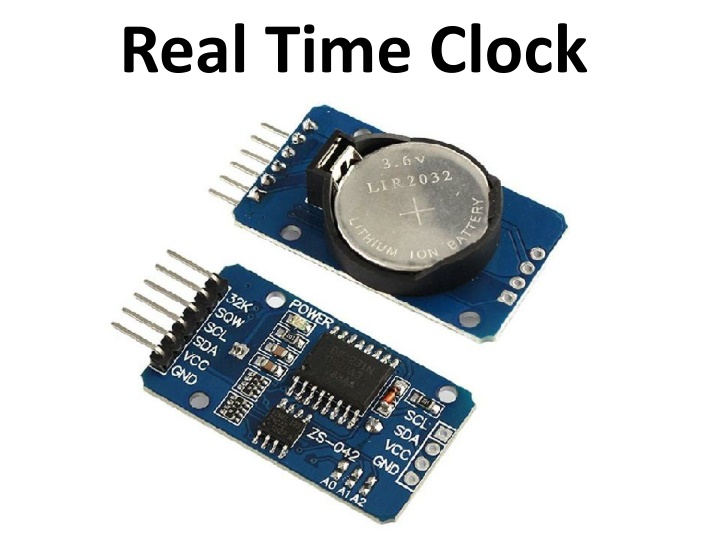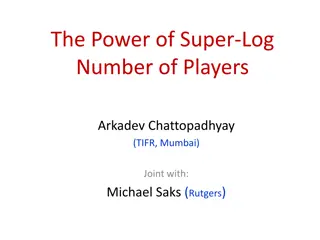
Real Time Clock (RTC) Modules for Arduino Projects
Explore the functionalities of Real Time Clock (RTC) modules like RTC3231, I2C protocol, and Arduino integration. Learn how to initialize, set date and time, and retrieve information from the DS3231 RTC module using Arduino for precise time tracking in your projects.
Uploaded on | 1 Views
Download Presentation

Please find below an Image/Link to download the presentation.
The content on the website is provided AS IS for your information and personal use only. It may not be sold, licensed, or shared on other websites without obtaining consent from the author. If you encounter any issues during the download, it is possible that the publisher has removed the file from their server.
You are allowed to download the files provided on this website for personal or commercial use, subject to the condition that they are used lawfully. All files are the property of their respective owners.
The content on the website is provided AS IS for your information and personal use only. It may not be sold, licensed, or shared on other websites without obtaining consent from the author.
E N D
Presentation Transcript
I2C protokoll (Philips, 1982) I2C ili IIC Inter Integrated Circuits SCL Serial CLock SDA Serial DAta
Arduino I2C Wire k nyvt r #include <wire.h> L teznek m s k nyvt rak is az I2C kommunik ci ra: rinkydinkelectronics.com, <DS3231.h> PDF!
Test 01 #include <DS3231.h> // Init the DS3231 using the hardware interface DS3231 rtc(SDA, SCL); void setup() { // Setup Serial connection Serial.begin(9600); // Uncomment the next line if you are using an Arduino Leonardo //while (!Serial) {} // Initialize the rtc object rtc.begin(); // The following lines can be uncommented to set the date and time //rtc.setDOW(SUNDAY); // Set Day-of-Week to SUNDAY //rtc.setTime(13, 10, 00); // Set the time to 12:00:00 (24hr format) //rtc.setDate(03, 05, 2020); // Set the date to January 1st, 2014 }
Test 01 void loop() { // Send Day-of-Week Serial.print(rtc.getDOWStr()); Serial.print(" "); // Send date Serial.print(rtc.getDateStr()); Serial.print(" -- "); // Send time Serial.println(rtc.getTimeStr()); // Wait one second before repeating :) delay (2000); }
Test 02 #include <DS3231.h> // Init the DS3231 using the hardware interface DS3231 rtc(SDA, SCL); // Init a Time-data structure Time t; void setup() { pinMode(13, OUTPUT); // Setup Serial connection Serial.begin(9600); // Uncomment the next line if you are using an Arduino Leonardo //while (!Serial) {} // Initialize the rtc object rtc.begin(); // The following lines can be uncommented to set the date and time //rtc.setDOW(SUNDAY); // Set Day-of-Week to SUNDAY //rtc.setTime(13, 50, 00); // Set the time to 12:00:00 (24hr format) //rtc.setDate(03, 05, 2020); // Set the date to January 1st, 2014 }
Test 02 void loop() { // Get data from the DS3231 t = rtc.getTime(); // Send date over serial connection Serial.print("Today is the "); Serial.print(t.date, DEC); // date Serial.print(". day of "); Serial.print(rtc.getMonthStr()); // rtc.getMonthStr() Serial.print(" in the year "); Serial.print(t.year, DEC); // year Serial.println("."); // Send Day-of-Week and time Serial.print("It is the "); Serial.print(t.dow, DEC); Serial.print(". day of the week (counting monday as the 1th), and it has passed "); Serial.print(t.hour, DEC); Serial.print(" hour(s), "); Serial.print(t.min, DEC); Serial.print(" minute(s) and "); Serial.print(t.sec, DEC); Serial.println(" second(s) since midnight.");
Test 02 // Send a divider for readability Serial.println(" - - - - - - - - - - - - - - - - - - - - -"); // Wait one second before repeating :) delay (1000); if (t.hour>0 && t.hour<7){ Serial.println("NIGHT"); } if (t.hour>=7 && t.hour<10){ Serial.println("MORNING"); } if (t.hour>=10 && t.hour<18){ Serial.println("DAY"); } if (t.hour>=18 && t.hour<24){ Serial.println("EVENING"); } delay(1000); Serial.println(rtc.getTemp()); delay(1000); }
Bounce const int buttonPin = 2; const int ledPin = 13; int ledState = LOW; boolean buttonState = LOW; Buttonstate -> HIGH Buttonstate -> LOW int numPress = 0; void setup() { pinMode(ledPin, OUTPUT); pinMode(buttonPin, INPUT); } void loop() { if(digitalRead(buttonPin)==HIGH && buttonState==LOW){ numPress++; buttonState = HIGH; } if(digitalRead(buttonPin)==LOW && buttonState==HIGH){ buttonState=LOW; } if(numPress == 10){ digitalWrite(ledPin, HIGH); } }
Debounce const int ledPin = 13; int ledState = LOW; boolean buttonState = LOW; boolean debounceButton(boolean state){ boolean stateNow = digitalRead(buttonPin); if(state != stateNow){ delay(10); stateNow = digitalRead(buttonPin); } return stateNow; } int numPress = 0; void setup() { pinMode(ledPin, OUTPUT); pinMode(buttonPin, INPUT); } void loop() { if(debounceButton(buttonState)==HIGH && buttonState==LOW){ numPress++; buttonState = HIGH; } if(debounceButton(buttonState)==LOW && buttonState==HIGH){ buttonState=LOW; } if(numPress == 10){ digitalWrite(ledPin, HIGH); } }
Vletlen szmsorozat Els v grehajt s int myRandomArray[100]; void setup() { Serial.begin(9600); } void loop() { Serial.print("Random sequence: "); for(int i=1; i<21; i++){ myRandomArray[i-1]=random(10); Serial.print(myRandomArray[i-1]); Serial.print(" "); } Serial.println(""); delay(1000); } M sodik v grehajt s
Vletlen szmsorozat int myRandomArray[100]; Els v grehajt s void setup() { pinMode(A0, INPUT); randomSeed(analogRead(A0)); Serial.begin(9600); } void loop() { Serial.print("Really random sequence: "); for(int i=1; i<21; i++){ myRandomArray[i-1]=random(10); Serial.print(myRandomArray[i-1]); Serial.print(" "); } Serial.println(""); delay(1000); //while(true); } M sodik v grehajt s
Serial plotter // Sawtooth byte b=0; void setup() { Serial.begin(9600); } void loop() { Serial.println(b++); delay(20); }
Serial plotter void setup() { Serial.begin(9600); } void loop() { int y1 = analogRead(A0); int y2 = analogRead(A1); int y3 = analogRead(A2); int y4 = analogRead(A3); Serial.print(y1); Serial.print(" "); Serial.print(y2); Serial.print(" "); Serial.print(y3); Serial.print(" "); Serial.println(y4); delay(100); }
Serial plotter void setup() { Serial.begin(9600); } void loop() { for(int j=0; j<360; j++){ Serial.print(sin(j*(PI/180))); Serial.print(" "); Serial.println(cos(j*(PI/180))); } }







